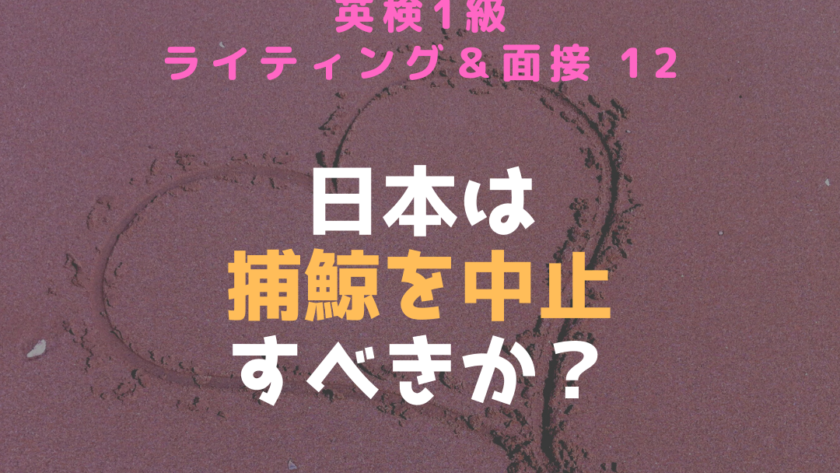目次
12 Agree Or Disagree: Japan should discontinue whaling.
日本は捕鯨を中止すべきか。
観点:鯨肉 / 失業 / 資源管理 / 多様性保全
POINTS: Whale Meat / Unemployment / Resource Management / Biodiversity Conservation
反捕鯨運動の背景
2019年に日本はIWCを脱退し、商業捕鯨を再開しました。
それ以前は、科学研究と称し何百ものクジラを殺していました。近年、欧米では研究のためとは言え、動物を殺したり、苦しめたりする可能性のある研究は余程の研究目的でなければ認められません。動物を殺したり、苦しめたりする可能性を避けるため善処し、もし万が一そのような状態になったらどうするかといったプロトコルを予め提出し承認されなければ研究も始められませんし、学術誌に掲載もされません。故に、絶滅危惧種まで殺してしまい、その鯨肉を販売している日本の調査捕鯨は、本当は調査ではなく商業目的なのではと思われても仕方ありませんでした。
現在の商業捕鯨は日本近海に留まるものですが、以前の調査捕鯨は南極海でも行っていたので、反捕鯨国から反感をかうのは当たり前のような気がします。
捕鯨問題は、生物多様性保全・動物福祉・文化・資源管理などさまざまな観点から考える必要があります。
Japan resumes commercial whaling after 30 years (English)

賛成派:捕鯨を中止すべきだ(238 語)
AGREE or DISAGREE; Japan should discontinue whaling.
POINTS: Whale Meat / Biodiversity Conservation / Resource Management
Introduction
I think Japan should cease commercial whaling because of the low demands of whale meat, questionable resource management and conservation of endangered animals.
鯨肉の低需要、疑わしい資源管理また絶滅危惧種の保全のため、日本は商業捕鯨を止めるべきだと考えます。
Discussion 1
Firstly, most Japanese do not eat whale meat today. The average consumption of whale meat per year is just 25g per person. Whale meat used to be a crucial protein source during and after the war. But, many other protein sources, which may be better and cheaper, are available today. How come we have to spend much fuel to operate large fishing vessels to catch something we don’t need?
まず、殆どの日本人はこんにち鯨肉を食べません。鯨肉の年間平均消費量は1人たったの25グラムです。戦中戦後は、鯨肉は重要なタンパク質源でした。しかし、こんにち鯨肉より良いそして安いタンパク質源が他にたくさんあります。必要でない何かを捕まえるため出港する大型漁船に多大な燃料を費やす必要がどこにあるのでしょうか?
Discussion 2
Unfortunately, the Japanese seem not to hesitate to eat endangered species, such as the Japanese eel and the Pacific Bluefin tuna. Japan targets to catch six species of whales for commercial whaling, including the endangered Sei whales. It’s high time that they shifted their mindset and prioritised the conservation of the endangered animals over their addiction to eating them.
不幸にも日本人は日本鰻やクロマグロといった絶滅危惧種を食べる事をいとわない様にみうけられます。日本は絶滅危惧種であるイワシクジラを含む6種のクジラを商業捕鯨のターゲットにしています。いい加減、考え方を改め絶滅危惧種の味を好んで食すより、それらを保全することを優先すべき時です。
Discussion 3
Finally, the Japanese fisheries agency may not be trustworthy regarding proper resource management for whaling even though they didn’t mean it. Resource management is one of the things that Japan is really behind the world standard. Besides, to date, their claims on scientific whaling or the catch quota they requested for the Pacific Bluefin tuna sounded like no intention to conserve the endangered species whatsoever.
最後に、意図的でないとしても、日本の水産庁はクジラの適切な資源管理に関しては信頼できないかもしれません。資源管理は日本が本当に世界標準から遅れをとっているものの1つです。その上、今までの調査捕鯨に関する水産庁の主張や要求してきたクロマグロの漁獲枠は、絶滅危惧種を守ろうとする意図なんて全くないよう聞こえます。
Conclusion
Some people may still eat whale meat in local areas. But, most people wouldn’t be opposed to it if Japan stopped whaling.
地方では、鯨肉を食べる人はまだいます。しかし、日本が捕鯨を中止して文句をいう人はほとんどいないでしょう。
賛成派:本文全文(音源つき)
I think Japan should cease commercial whaling because of the low demands of whale meat, questionable resource management and conservation of endangered animals.
Firstly, most Japanese do not eat whale meat today. The average consumption of whale meat per year is just 25g per person. Whale meat used to be a crucial protein source during and after the war. But, many other protein sources, which may be better and cheaper, are available today. How come we have to spend much fuel to operate large fishing vessels to catch something we don’t need?
Unfortunately, the Japanese seem not to hesitate for eating endangered species, such as the Japanese eel and the Pacific bluefin tuna. Japan targets to catch six species of whales for commercial whaling, including the endangered Sei whales. It’s high time that they shifted their mindset and prioritised the conservation of the endangered animals over their addiction to eating them.
Finally, the Japanese fisheries agency may not be trustworthy regarding proper resource management for whaling even though they didn’t mean it. Resource management is one of the things that Japan is really behind the world standard. Besides, to date, their claims on scientific whaling or the catch quota they requested for the Pacific Bluefin tuna sounded like no intention to conserve the endangered species whatsoever.
Some people may still eat whale meat in local areas. But, most people wouldn’t be opposed to it if Japan stopped whaling.
反対派: 捕鯨を継続すべきだ(238 語)
AGREE or DISAGREE; Japan should continue whaling.
POINTS: Resource Management / Unemployment / Whale Meat
Introduction
It seemed as if a whole world was against Japan’s whaling, but in fact, a few international NGOs’ strong anti-whaling campaigns made it just that way. Japan has good reasons to continue whaling as follows.
まるで世界中が日本の捕鯨に反対していたかのようだったが、実際は少数の国際NGOの強い反捕鯨運動がそのように見せていただけです。日本には、以下のように捕鯨を継続する正当な理由があります。
Discussion 1
According to the Japanese fishery agency, Japan now targets only three species of whales with a kill cap for each species based on scientific data. Then, each species would not go extinct under the proper resource management. Furthermore, we sometimes need to cull a species that excessively increased in the ecosystem we interact with in any way. Otherwise, the ecosystem would lose its balance.
日本の水産庁によりますと、現在日本は3種のみのクジラの捕獲をしており、それぞれの種には科学データを下に捕獲制限数をもうけています。ですから、適切な資源管理の下では、これら3種のクジラが絶滅することはないでしょう。さらには、どういった形でも人間が手を加えている生態系において過剰に個体数が増えた種は、時折間引きする必要があります。そうしなければ、生態系のバランスは壊れてしまうでしょう。
Discussion 2
Just like other industries, whaling has provided many people with jobs for a long time. If Japan discontinued whaling, the ageing whalers could not find another job in their local areas. It is vital to conserve wildlife, but humans also need to be protected. Both whales and humans would survive if whaling continued under appropriate resource control.
他産業と同じように、捕鯨は長年雇用の機会を与えてきました。もし日本が捕鯨を中止するなら、老化しつつある捕鯨員達が地元で他の仕事を見つけるのは困難でしょう。野生動物の保全は必須ですが、人間もまた守られるべきです。適切な資源管理の下捕鯨を継続すれば、クジラも人も双方が生き残れることでしょう。
Discussion 3
Although whale meat is not so popular today, people have continued whaling for hundreds of years in some local coastal areas, such as Taiji, Wakayama pref. The local people still consume about four times more whale meat than average Japanese. For those, eating whale meat may not only mean having a meal but also recalling memories or events associated with whale meat.
今日、鯨肉はあまり普及していませんが、和歌山県の太地町のような地方の海岸沿いでは何百年もの間、捕鯨が続いています。地元の人々は今なお鯨肉を食しており、その量は平均的な日本人と比べると4倍ほどになります。彼らにとって鯨肉を食すことは、食事をすることを意味するだけでなく鯨肉にまつわる記憶やイベントを思い出すことでもあるかもしれません。
Conclusion
As long as Japan does whaling under proper resource management, Japan should not mind aggressive protests whaling and continue whaling.
適切な資源管理の下で捕鯨をする限り、日本は攻撃的な捕鯨抗議を気にすることなく捕鯨を継続するべきです。
反対派:本文全文(音源つき)
It seemed as if a whole world was against Japan’s whaling, but in fact, a few international NGOs’ strong anti-whaling campaigns made it just that way. Japan has good reasons to continue whaling as follows.
According to the Japanese fishery agency, Japan now targets only three species of whales with a catch quota for each species based on scientific data. Then, each species would not go extinct under the proper resource management. Furthermore, we sometimes need to cull a species that excessively increased in the ecosystem we interact with in any way. Otherwise, the ecosystem would lose its balance.
Just like other industries, whaling has provided many people with jobs for a long time. If Japan discontinued whaling, the ageing whalers could not find another job in their local areas. It is vital to conserve wildlife, but humans also need to be protected. Both whales and humans would survive if whaling continued under appropriate resource control.
Although whale meat is not so popular today, people have continued whaling for hundreds of years in some local coastal areas, such as Taiji, Wakayama pref. The local people still consume about four times more whale meat than average Japanese. For those, eating whale meat may not only mean having a meal but also recalling memories or events associated with whale meat.
As long as Japan does whaling under proper resource management, Japan should not mind aggressive anti-whaling protests and continue whaling.
まとめ
釧路では昨年の夏、ミンククジラが水揚げされました。スーパーにも鯨肉が並んでいました。一体どのくらいの人が購入されたのでしょうか?昔は給食で鯨肉を食べた人たちが懐かしんで買われたのでしょうか?それとも若い世代が購入したのでしょうか?
地元で食べられている物だからこそ、馴染み深いトピックだと思います。だからこそ、賛成と反対の両方の意見を調べ自分自身の考えをもつ機会にしていただけたらなと思います。
こちらの記事もお薦めです。Agree Or Disagree: 原子力発電はクリーンエネルギーか。




